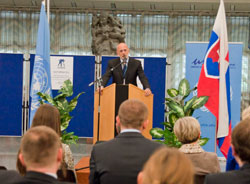
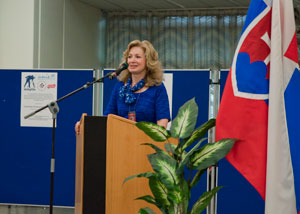
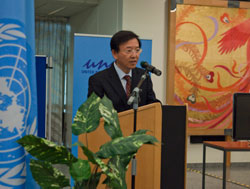
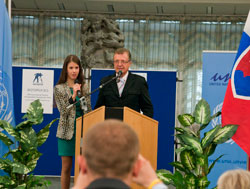
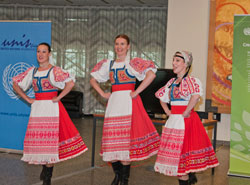
In the run-up to the UN Conference on Sustainable Development to be held in Rio de Janeiro from 20 to 22 June 2012, a Sustainable Development Film Week at the UN in Vienna is putting the spotlight on the ideas of film-makers from around the world on a range of sustainable development issues.
The Sustainable Development Film Week, taking place 14-18 May at the UN headquarters in Vienna, is organized by the United Nations Information Service (UNIS) Vienna, in cooperation with the Permanent Mission of Slovakia to the United Nations (Vienna), the Slovak Institute and the EKOTOPFILM International Festival of Sustainable Development Films.

The EKOTOPFILM Festival is an annual film festival held in Bratislava, Slovakia, already in its 39th year, focusing specifically on sustainable development.
The programme of the Film Week includes the screening of the UN Television documentary Africa: Digital Graveyard, produced by Mary Ferreira, which won first place in the Current Affairs category at the EKOTOPFILM Festival in 2011. The film explores the growing problem of electronic, or e-waste, disposal.
Other screenings include Trou de Fer by Slovak Director Pavol Barabas, set on Reunion Island and Architects of Change: Nothing is Lost, by Jean Bourbonnais, showcasing three environmental innovators in different countries. The programme also presents a selection of creative short films on topics such as the future of the world without air, or the disturbing idea of man-eating tomatoes.
At the opening ceremony, UNIS Vienna Director Janos Tisovszky said the sustainable development film festival was a unique and inspiring way of engaging film-makers and audience alike in a discussion on the kind of future they want, referring to the United Nations "The Future We Want" campaign, an exercise to envision how societies in all parts of the world can build a future that promotes prosperity, equity and improves people's quality of life within the Earth's life support systems.
The world tomorrow depends on our actions today, said Hana Kovacova Chargée d'Affaires, Permanent Mission of Slovakia to the United Nations (Vienna), so the Film Week at the UN in Vienna should generate debate on our future and that of our children.
The Deputy to the Director-General of the United Nations Industrial Development Organization (UNIDO) Taizo Nishikawa emphasized that greening manufacturing processes and building new, green industries was a key component of a sustainable industrialization and thus the sustainable development approach. Greening industries was therefore central to the UNIDO mandate.
The General Director of EKOTOPFILM Festival Pavol Lim spoke about the 39-year tradition of the Festival, which in its early days was intended to host an exchange of ideas among two potentially antagonistic groups, environmental activists and technicians. This philosophy was enhanced throughout the history of the Festival, and EKOTOPFILM's first presentation at the United Nations now presented an opportunity of triggering future interaction with the UN system.
The Film Week was accompanied by a cultural programme organized by the Slovak Institute in Vienna, with a performance of the famous Slovakian folk art ensemble SL'UK as its highlight.
On the occasion of the Film Week, the United Nations headquarters in Vienna also hosted an exhibition of 30 finalist entries of the Drop by Drop - the Future We Want Competition, launched by the United Nations Regional Information Centre in Brussels (UNRIC) in partnership with the United Nations Environment Programme (UNEP), the Office of the High Commissioner for Human Rights, and with the support of the Nordic Council of Ministers. In the competition Europeans had been asked to create a newspaper ad that inspires others to preserve water now and for future generations.